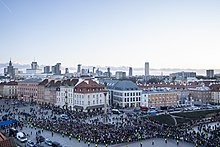
Vladimir Vladimirovich Putin is a Russian politician and former intelligence officer who has been President of Russia since 2012. Putin has held continuous positions as president or prime minister since 1999: as prime minister from 1999 to 2000 and from 2008 to 2012, and as president from 2000 to 2008. He is the longest-serving Russian or Soviet leader since Joseph Stalin.

The Group of Seven (G7) is an intergovernmental political and economic forum consisting of Canada, France, Germany, Italy, Japan, the United Kingdom and the United States; additionally, the European Union (EU) is a "non-enumerated member". It is organized around shared values of pluralism, liberal democracy, and representative government. G7 members are the major IMF advanced economies.

Russia and the United States maintain one of the most important, critical and strategic foreign relations in the world. Both nations have shared interests in nuclear safety and security, nonproliferation, counterterrorism, and space exploration. Due to the 2022 Russian invasion of Ukraine, relations became very tense after the United States imposed sanctions against Russia. Russia placed the United States on a list of "unfriendly countries", along with Taiwan, South Korea, Japan, Singapore, European Union members, NATO members, Australia, New Zealand, Switzerland, Micronesia and Ukraine.

Relations between Ukraine and the North Atlantic Treaty Organization (NATO) started in 1991. Ukraine applied to integrate with a NATO Membership Action Plan (MAP) in 2008. Plans for NATO membership were shelved by Ukraine following the 2010 presidential election in which Viktor Yanukovych, who preferred to keep the country closer to Russia, was elected President. Yanukovych fled Ukraine in February 2014 during the Revolution of Dignity. The interim Yatsenyuk Government initially said that it had no plans to join NATO. However, following the Russian annexation of Crimea and Russian military support for armed separatists in eastern Ukraine, the Second Yatsenyuk Government made joining NATO a priority. In February 2019, the Ukrainian parliament voted to amend the Constitution of Ukraine to state Ukraine's goal of NATO and European Union membership.

The Russo-Ukrainian War is an ongoing international conflict between Russia and Ukraine, which began in February 2014. Following Ukraine's Revolution of Dignity, Russia annexed Crimea from Ukraine and supported pro-Russian separatists fighting the Ukrainian military in the Donbas war. The first eight years of conflict also included naval incidents, cyberwarfare, and heightened political tensions. In February 2022, Russia launched a full-scale invasion of Ukraine and began occupying more of the country.
The foreign policy of the Joe Biden administration emphasizes the repair of the United States' alliances, which Biden argues were damaged during the Trump administration. The administration's goal is to restore the United States to a "position of trusted leadership" among global democracies in order to address challenges posed by Russia and China. Both Biden and his Secretary of Defense Lloyd Austin have repeatedly emphasized that no other world power should be able to surpass the United States, either militarily or economically.

The 2022 G20 Bali summit was the seventeenth meeting of Group of Twenty (G20), which was held in Nusa Dua, Bali, Indonesia on 15–16 November 2022. Indonesia's presidency began on 1 December 2021, leading up to the summit in the fourth quarter of 2022. The presidency handover ceremony was held as an intimate event, in which the G20 presidency gavel was transferred from Italian Prime Minister Mario Draghi to Indonesian president Joko Widodo at the close of the Rome summit. Preceding the G20 Leaders Summit, a youth engagement group of the G20, Youth20 (Y20) held its Y20 Indonesia 2022 Summit in Jakarta and Bandung in July 2022.

The Bucharest Nine or the Bucharest Format is an organization founded on 4 November 2015 in Bucharest, Romania, at the initiative of the President of Romania Klaus Iohannis and the President of Poland Andrzej Duda during a bilateral meeting between them. Its members are Bulgaria, the Czech Republic, Estonia, Hungary, Latvia, Lithuania, Poland, Romania and Slovakia. Its appearance was mainly a result of a perceived aggressive attitude from Russia following the annexation of Crimea from Ukraine and its posterior intervention in eastern Ukraine both in 2014. All members of the B9 were either part of the former Soviet Union (USSR) or members of the defunct Soviet-led Warsaw Pact.

The 48th G7 summit was held from 26 to 28 June 2022 in Schloss Elmau, Krün, Bavarian Alps, Germany. Germany previously hosted a G7 summit in 2015 at Schloss Elmau.

The following is a timeline of the presidency of Joe Biden during the first quarter of 2022, from January 1 to March 31, 2022. To navigate between quarters, see timeline of the Joe Biden presidency.
On 24 February 2022, Russia launched a military invasion of Ukraine in a steep escalation of the Russo-Ukrainian War. The campaign had been preceded by a Russian military buildup since early 2021 and numerous Russian demands for security measures and legal prohibitions against Ukraine joining NATO.

The Russian invasion of Ukraine received widespread international condemnation, leading to new sanctions being imposed on Russia, which triggered a Russian financial crisis. Reactions among governments have most often been negative, with criticism and condemnation, particularly in Europe, the Americas, and Southeast Asia.

The response of the United States to the ongoing Russian invasion of Ukraine that began in 2022 has been in favor of Ukraine. President Biden condemned the invasion, providing military and humanitarian aid to Ukraine, and sanctioning Russia and Belarus, the countries heavily involved in invading Ukraine.

The 2022 Brussels summit was a meeting of the heads of state and heads of government of NATO held in Brussels, Belgium, on 24 March 2022. The meeting took place in the wake of the 2022 Russian invasion of Ukraine.

The following is a timeline of the presidency of Joe Biden during the second quarter of 2022, from April 1 to June 30, 2022. To navigate between quarters, see timeline of the Joe Biden presidency.
In the context of the enlargement of NATO, Article 10 of the North Atlantic Treaty is the origin for the April 1999 statement of a "NATO open door policy". The open door policy requires a consensus in favour of countries applying to join NATO, as all member states must ratify the protocol enabling a new country to become a member of NATO. The open doors policy "is aimed at promoting stability and cooperation".
During the Russian invasion of Ukraine, several senior Russian politicians, including president Vladimir Putin, former president and prime minister Dmitry Medvedev, and foreign minister Sergey Lavrov, have made a number of statements widely seen as threatening the use of nuclear weapons. The possibility of Russia using tactical nuclear weapons, and the risk of broader nuclear escalation, has been widely discussed by commentators and in the media. Additionally, the Russian occupation of the Zaporizhzhia Nuclear Power Plant has led to a crisis over the safety of the plant and the risk of a nuclear disaster.

The 2023 Vilnius summit was a meeting of the heads of state and heads of government of the thirty-one members of the North Atlantic Treaty Organization (NATO), their partner countries, and the European Union, held in Vilnius, Lithuania, on 11–12 July 2023. The summit was officially proposed during the previous 2022 Madrid summit and its dates were fixed on 9 November 2022. It was notable for the discussions about the ongoing Russian invasion of Ukraine as well as Sweden and Ukraine's prospective memberships into the alliance.

On 21 February 2023, almost a year after Russia launched a full-scale invasion of Ukraine, Russian president Vladimir Putin delivered an address to the Federal Assembly, at Gostiny Dvor in Moscow, Russia. This was the first Presidential Address to the Federal Assembly since the start of the invasion; Putin did not deliver such an address in 2022.



















